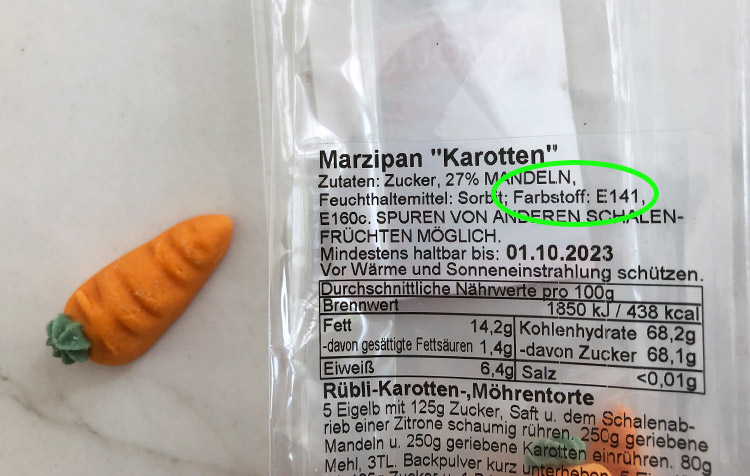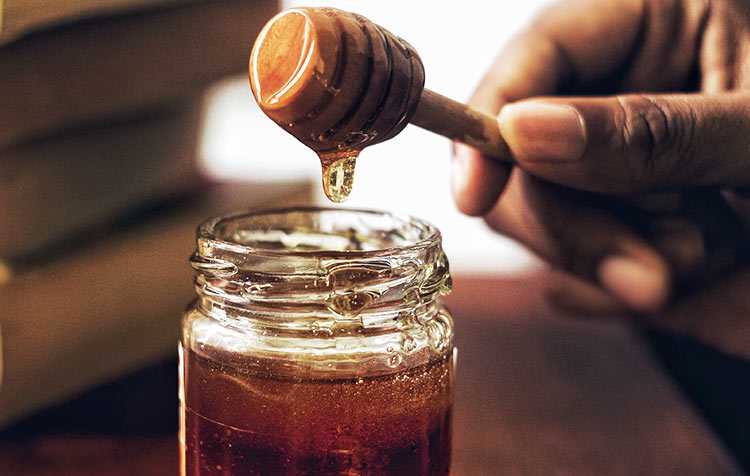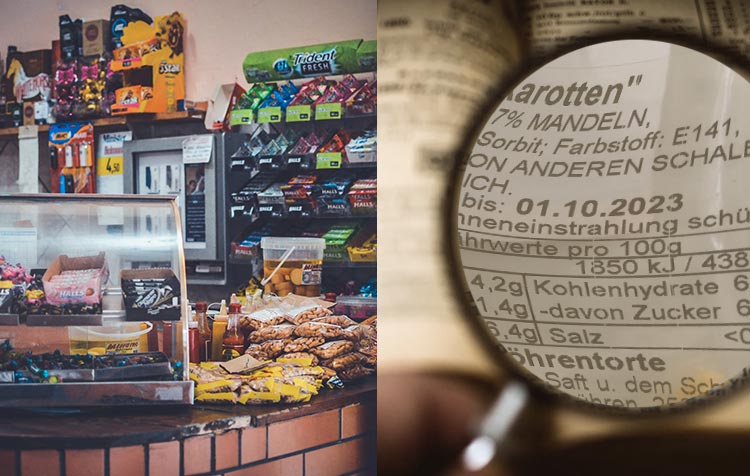Looking for non-vegan E-numbers and additives that are unsuitable for vegans? Then you've come to the right place! Additives are increasingly being added to processed foods, for example to make them look more appealing, to increase their shelf life or simply to make them taste better. Unfortunately, we are now in a confusing jungle of E-numbers and names for food but also other everyday products such as cosmetics - and unfortunately many of the added ingredients and additives are of animal origin. As long as you do not completely renounce processed foods in a vegan lifestyle, it is important to know them.
In this article I would like to give you a list of E-numbers that are never or only sometimes vegan. In addition, I will show you what vegans should pay special attention to when it comes to food ingredients. Let's go!
In advance, here is a brief overview for you:
- What are E numbers?
- Non vegan E numbers
- E numbers that can also be vegan
- Other non-vegan additives
- Closing words
What are E-numbers anyway?

Basically, the "E numbers" are nothing more than Designations for food additives approved (at least) in the EU. The "E" stands for Europe - and the respective number has been assigned to one of the now more than 300 permitted additives. A significant proportion of them are considered to be of concern - but around 40 substances behind the E numbers are also permitted in Organic food allowed.
The E-numbers are mainly found on the back of processed ready meals. The corresponding substances are predominantly Colorants, thickeners, emulsifiers, antioxidants, flavor enhancers, and sugar substitutes and preservatives.. They are supposed to make the products shine, make them more durable, separate ingredients from each other, provide a pleasant consistency and sweeten the taste.
But as I said - it's a jungle that's almost impossible to navigate. So focus! We hold: Non-vegan E numbers are accordingly the E-numbers hiding ingredients and additives of animal origin.
Which E-numbers hide non-vegan products?
Now we continue with the concrete, non-vegan E-numbers and additives. If you know them (and this article as a kind of small reference book), it will be easier for you to consume, if possible, only those foods and goods that have been produced animal-free and, above all, animal suffering-free from the manufacturing phase to the labeling.
The The following list of E-numbers or additives of animal origin₁ was compiled by the consumer advice center. It is advisable to know the name of the additive as well, since manufacturers are also allowed to mention the usually more harmless-sounding name in the ingredients instead of the E-number.
Important notes: Please keep in mind that this list of non-vegan E-numbers from the consumer advice center does not guarantee completeness - and that some of the listed substances also exist in a vegan form. Italic written lines I have also added independently.
List of non-vegan E-numbers and additives
| E-number | Additive | Function |
|---|---|---|
| E120 | Carminic acid | Red dye |
| E132 | Indigo Carmine | Dye |
| E270 | Lactic acid | Acidifier |
| E304 | Fatty acid esters of ascorbic acid | Antioxidant |
| E322 | Lecithin | Emulsifier, antioxidant, stabilizer, flour treatment agent |
| E325 | Sodium lactate | Acidity regulator, melting salt, solidifying agent |
| E339 | Sodium phosphates | Antioxidant, Melting Salts, Acidifier |
| E422 | Glycerin | Filler and humectant. |
| E434 | Polyoxyethylene sorbitan monopalmitate (polysorbate 40) | Emulsifiers and complexing agents. |
| E435 E436 | Polyoxyethylene sorbitan monostearate (polysorbate 60)Polyoxyethylene sorbitan tristearate (polysorbate 65) | Emulsifiers and complexing agents |
| E445 | Glycerol ester from root resin/colophonic ester | Stabilizer and opacifier. |
| E451 | Triphosphates, phosphate | Emulsifiers, stabilizers and acidity regulators |
| E452 | Polyphosphates | Emulsifiers, stabilizers and acidity regulators. |
| E470A | Sodium, potassium and calcium salts of fatty acids, salts of fatty acids | Emulsifiers, carriers and foaming agents |
| E470B | Magnesium salts of edible fatty acids, salts of edible fatty acids | Emulsifier, carrier and foaming agent |
| E471 | Mono- and diglycerides of fatty acids | Emulsifiers, coating and flour treatment agents |
| E472A | Acetic acid esters of mono- and diglycerides of fatty acids | Emulsifiers, coating and flour treatment agents |
| E472B | Lactic acid esters of mono- and diglycerides of fatty acids | Emulsifiers, foam stabilizers of flour treatment agents |
| E472C | Citric acid esters of mono- and diglycerides of fatty acids | Emulsifiers, antioxidants and flour treatment agents |
| E472D | Tartaric acid esters of mono- and diglycerides of fatty acids | Baking emulsifiers and flour treatment agents |
| E472E | Mono- and diacetyl tartaric acid esters of mono- and diglycerides of fatty acids | Flour treatment agents and emulsifiers |
| E472F | Mixed acetic and tartaric esters of mono- and diglycerides of fatty acids | Baking emulsifiers and flour treatment agents |
| E473 | Sugar esters of fatty acids | Emulsifiers and flour treatment agents |
| E474 | Sugar glycerides | Emulsifiers and flour treatment agents |
| E475 | Polyglycerol esters of fatty acids | Emulsifiers and stabilizers |
| E476 | Polyglycerol polyricinoleate | Emulsifier and stabilizer |
| E477 | Propylene glycol esters of fatty acids | Emulsifiers and crystal influencers of hard fats |
| E479 | Thermooxidized soybean oil with mono- and diglycerides of fatty acids | Emulsifiers and release agents |
| E481 E482 | Sodium stearoyl-2-lactylate Calcium stearoyl-2-lactylate | Artificial emulsifier and flour treatment agent |
| E491 | Sorbitan monostearate | Emulsifier, defoamer, fat crystal influencer |
| E492 | Sorbitan tristearate | Emulsifier, defoamer, fat crystal influencer |
| E493 | Sorbitan monolaurate Sorbitan monooleate | Emulsifier, defoamer or fat crystal influencer |
| E495 | Sorbitan monopalmitate | Emulsifier |
| E542 | Bone phosphate | Anti-caking agent |
| E570 | Fatty acids, edible fatty acids | Emulsifiers, coating and release agents |
| E574 | Gluconic acid | Acidity regulator, stabilizer and complexing agent |
| E585 | Iron II lactate | Color stabilizer |
| E620 | Glutamic acid | Flavor enhancer |
| E621 | Monosodium glutamate, sodium glutamate | Flavor enhancer |
| E622 | Monopotassium glutamate, potassium glutamate | Flavor enhancer |
| E623 | Calcium diglutamate, calcium glutamate | Flavor enhancer |
| E624 | Monoammonium glutamate, ammonium glutamate | Flavor enhancer |
| E625 | Magnesium diglutamate, magnesium glutamate | Flavor enhancer |
| E634 | Calcium 5'-ribonucleotide | Flavor enhancer |
| E635 | Disodium 5'-ribonucleotide | Flavor enhancer |
| E640 | Glycine and its sodium salts | Flavor enhancer |
| E901 | Beeswax white and yellow | Release and coating agents |
| E904 | Shellac | Release and coating agents |
| E920 | L-Cysteine | Flour treatment agent |
| E966 | Lactite | Sweetener, sugar substitute and carrier |
| E1105 | Lysozyme | Preservative for hard as well as semi-hard cheeses and as enzyme for all foods |
Which of the E numbers can also be vegan?
As already briefly indicated, some of the listed E-numbers are not necessarily "unvegan". Therefore, here I present you the ingredients that can theoretically also have a plant origin:
- L-Cysteine (E920) can also be vegan
- Mono- and diglycerides (E471, fatty acids) can also be vegan
- Glutamic acid/sodium glutamate (E620) may be vegan
- Anthocyanins (E163) can also be vegan
- Lecithin (E322) can also be vegan
- Riboflavin (E101) can also be vegan
- Disodium Osinate (E631) can also be vegan
- Indigo Carmine (E132) can also be vegan
- …
Do you know of any other E-numbers or additives in foods that can be of both animal and plant origin? Then just write a short comment and I will add to the listing.
Non-vegan additives without E-number

Now you know the non-vegan additives and ingredients that are hidden behind many E-numbers. But there are still some more ingredients (but without E-number), around which you have to be careful with the vegan diet or with the vegan lifestyle should give a wide berth.
Here I list them for you as well:
- Albumin (protein)
- Flavors
- Castoreum/Castoreum
- Butterfat
- Skimmed or whole milk powder
- Ghee (clarified butter)
- Gelatine
- Honey
- Isinglass
- Casein (but can also be vegan)
- Lactose (lactose)
- Lanolin/wool wax (e.g. for vitamin D3 capsules, but can also be vegan).
- Lab
- Stearic acid (but can also be vegan)
- Tallow/Talg
- Whey/Whey
- …
Notice: Even this overview is certainly not perfect! If you know other, not vegan ingredients, I'm happy about your support with a hint in the comments.
Know and avoid non-vegan E-numbers and additives
Especially when looking at the ingredients of finished products, E-numbers or the names of the corresponding additives can be seen again and again. Many people are not aware and perhaps do not care whether they are of animal or plant origin. But if they knew that body parts or even excretions (e.g. in the case of shellac (E 904)) from animals were in a food, they would probably no longer eat it.
I really hope that this list will help you to identify non-vegan E-numbers and ingredients faster in the future. If you are not sure whether vegan or not, you can simply ask the respective manufacturer in person, by phone or by mail. Living as vegan as possible is simply a constant learning process.
Do you have questions, tips or other E-numbers and substances that should be added here? Then I am curious about your message in the comments column.
Be always kind to animals,

PS.: Under "why go vegan?" I will now explain all my personal motives for the plant-based diet and the vegan lifestyle. They make clear to you why I make no exception even with seemingly insignificant ingredients.
References:
₁ Jutta Schulte: Additives from animals (as of 13.06.2022), available at https://verbraucherschutz.bio/bio-im-alltag/zusatzstoffe-aus-tieren. [15.06.2022].





